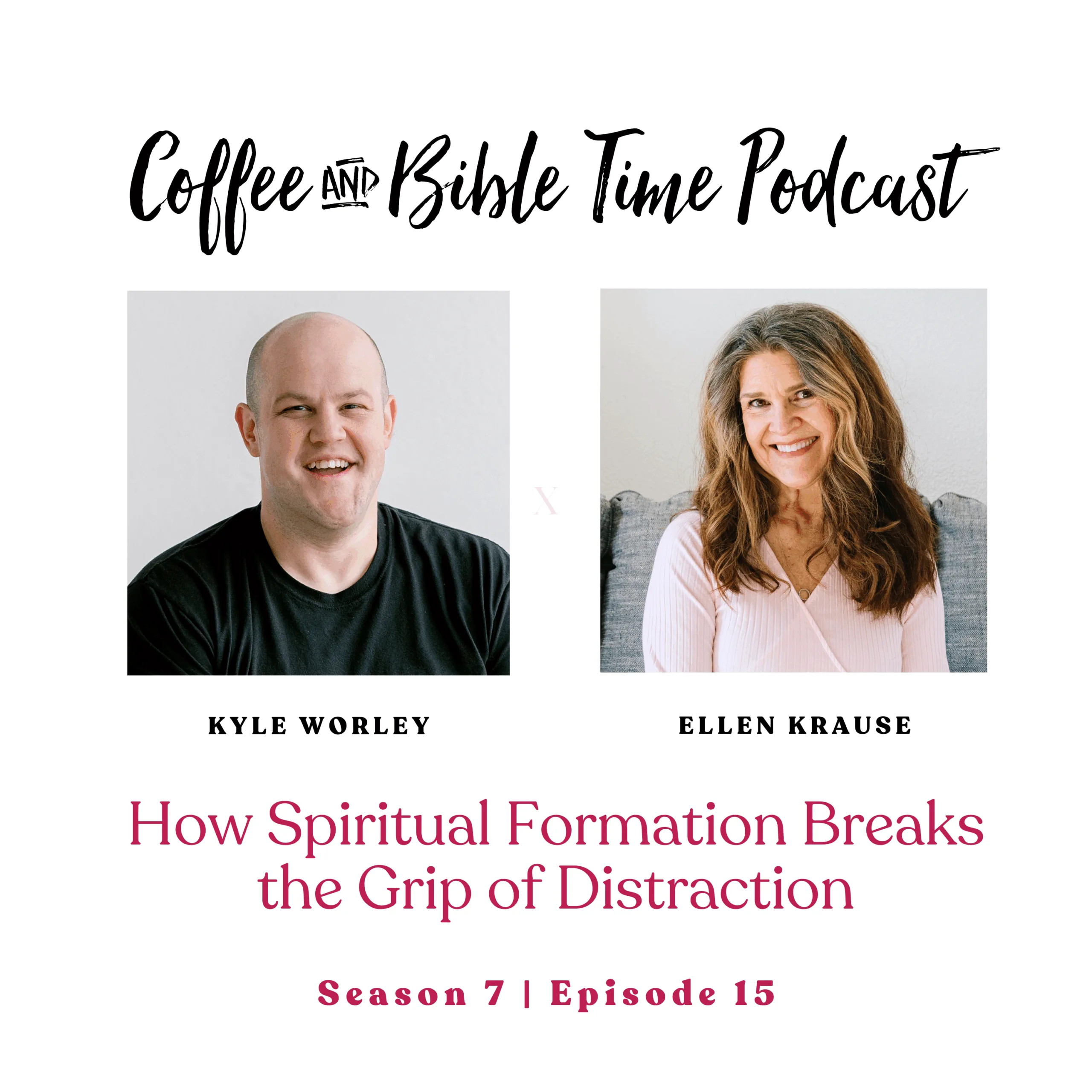Hosted by Ellen Krause
Spiritual Formation vs. Distraction
Spiritual formation isn’t about doing more for God, it’s about being with him.
Whether we realize it or not, we’re being shaped—by our habits, our screens, our fears, and ultimately by what we love most.
A lot of believers know what to do—read the Bible, pray, fast, worship—but they don’t always understand why these practices matter.
This episode, featuring guest Kyle Worley, explores how practices like prayer, Bible reading, and obedience draw us into deeper relationship with God and others.
Subscribe & Listen on:

Get your copy here: Formed for Fellowship: Becoming What You Behold
Learn more about Kyle: Website │ Instagram │ X
Kyle’s Bible Study Tools:
CSB Bible │ ESV Bible │ Spiral-Bound Journaling Bible (ESV) │ iBayam Pens │Logos Bible Software
Topics Discussed in This Episode:
Formed by Love (03:30)
Love is foundational to spiritual formation. The point isn’t to master a task, it’s to commune with God! These practices are invitations, not just obligations. They help us discover more of who He is.
Why Spiritual Formation Matters (08:33)
Distraction isn’t a new problem. In the past, it looked like constant labor or basic survival. Today, it’s more digital or psychological: shame, fear, anxiety, or self-focus.
The biggest distraction across all ages is looking at ourselves more than looking at Christ.
So how do we return our gaze to God? Through the same practices:
- Scripture, because we need God’s words, not just our thoughts
- Prayer, because we’re invited to speak and listen
- Community, because we need others to help us see clearly
- Love, because it mirrors God’s own heart
It may sound ordinary—but those simple, faithful rhythms are the foundation of spiritual formation.
Practical Advice for Spiritual Formation (11:50)
When someone feels stalled in their spiritual formation, I typically offer three simple steps:
- Engage Scripture Differently
- If reading small sections of the Bible feels stale, try listening to it. Use an app or YouTube to hear it read aloud. Even better—read it with someone. The Bible was first heard, not read. Auditory engagement can bring new life to your spiritual rhythm.
- Fast and Pray
- Fasting and prayer aren’t easy, but they’re accessible and powerful. Jesus told His disciples that some spiritual breakthroughs only come through these practices. If you’re stuck or caught in a pattern of sin, don’t overcomplicate things. Step away for a day. Fast. Pray. Ask for God’s mercy and clarity. He welcomes that.
- Share the Gospel
- Evangelism is one of the most neglected disciplines, yet it’s deeply formative. Sharing Christ—especially when it’s uncomfortable—creates spiritual dependence. The New Testament believers experienced vitality because they lived on mission, even in the face of suffering.
These practices—Scripture, fasting, evangelism—are simple, not necessarily easy. But they’re always available, and I rarely see someone remain stuck if they genuinely commit to them.
Pursuing Deeper Intimacy with God Through Spiritual Formation (16:26)
Here’s the paradox: the closer you grow to God, the more clearly you see His holiness. And in that light, you recognize your own unworthiness. That doesn’t mean failure—it means maturity.
So if you’re walking faithfully but feel distant, that may actually be a sign of spiritual health. You’re becoming more aware of God’s greatness and your need for Him. That awareness creates longing—not away from God, but toward Him. That’s what intimacy looks like in spiritual formation.
Community as Context for Spiritual Formation (21:53)
In the New Testament, spiritual formation almost always happens in the context of community—especially the local church. You can’t walk with God in isolation. A personal walk with God isn’t meant to be private.
If you try to live a solo Christian life, not only will you miss out on transformation, it could actually be spiritually harmful. The church is where we gather weekly to practice the rhythms we carry into the rest of the week—hearing the Word, singing together, receiving communion, witnessing baptism. These are all gospel “show and tells.”
Spiritual practices like prayer, Bible reading, and evangelism are richer in community. Even when Jesus sent out His disciples, He sent them in pairs. They listened, ate, traveled, and served in community.
Perfection vs. Progress (27:15)
Hebrews 10:14 says we’ve been “perfected for all time” while “being sanctified.” That’s the tension of the Christian life. In Christ, we are already perfect. But practically, we’re still becoming what God says we are.
This is the difference between justification (being declared righteous) and sanctification (being made righteous). We are learning to live out what’s already true of us. John says in 1 John 2, “I’m writing so you won’t sin—but if you do, you have an advocate.” That’s the beauty of the Gospel—God isn’t waiting to make up His mind about you. You are already loved.
Resources:
Scripture:
- Matthew 22:37
- Genesis 1-3
- Revelation 21-22
- Romans 1:22-25
- Psalm 16:11
- Mark 6:7-13
- Hebrews 10:14
- 1 John 2
About Kyle:
- Book: Formed for Fellowship: Becoming What You Behold
- Website: https://kyleworley.net/
- Instagram: https://www.instagram.com/kyleworley/
- X: https://x.com/kyleworley
Kyle’s Bible Study Tools:
- CSB Bible: https://amzn.to/3SpG2zz
- ESV Bible: https://amzn.to/457MBhy
- Spiral-Bound Journaling Bible: https://amzn.to/42Z0Eon
- iBayam Pens: https://amzn.to/4mePWBp
- Logos Bible Software: https://www.logos.com/
- Dwell App: dwellapp.io/
Calls-to-Action:
- Join our Community: coffeeandbibletime.com/community/
- Subscribe to our YouTube channel: www.youtube.com/@coffeeandbibletime
- Follow us on Instagram: www.instagram.com/coffeeandbibletime/
- Subscribe to our email for more content like this!



 Apple Podcasts
Apple Podcasts Spotify
Spotify
Leave a Reply